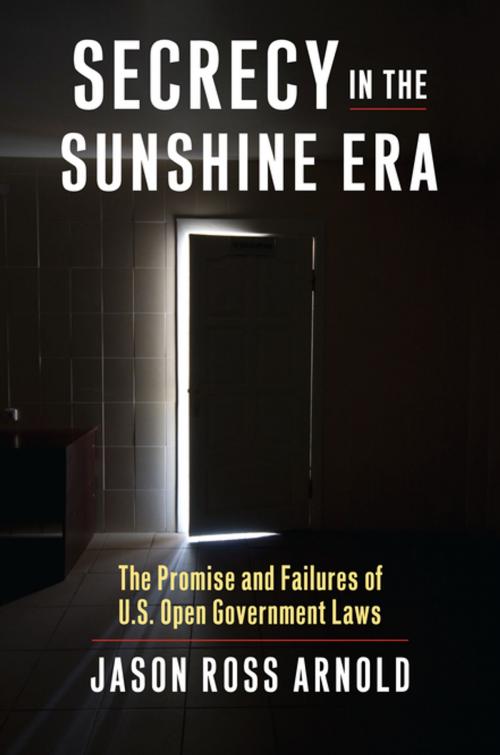Secrecy in the Sunshine Era
The Promise and Failures of U.S. Open Government Laws
Nonfiction, Social & Cultural Studies, Political Science, International, International Security, Government| Author: | Jason Ross Arnold | ISBN: | 9780700620425 |
| Publisher: | University Press of Kansas | Publication: | September 25, 2014 |
| Imprint: | University Press of Kansas | Language: | English |
| Author: | Jason Ross Arnold |
| ISBN: | 9780700620425 |
| Publisher: | University Press of Kansas |
| Publication: | September 25, 2014 |
| Imprint: | University Press of Kansas |
| Language: | English |
A series of laws passed in the 1970s promised the nation unprecedented transparency in government, a veritable "sunshine era." Though citizens enjoyed a new arsenal of secrecy-busting tools, officials developed a handy set of workarounds, from over classification to concealment, shredding, and burning. It is this dark side of the sunshine era that Jason Ross Arnold explores in the first comprehensive, comparative history of presidential resistance to the new legal regime, from Reagan-Bush to the first term of Obama-Biden.
After examining what makes a necessary and unnecessary secret, Arnold considers the causes of excessive secrecy, and why we observe variation across administrations. While some administrations deserve the scorn of critics for exceptional secrecy, the book shows excessive secrecy was a persistent problem well before 9/11, during Democratic and Republican administrations alike. Regardless of party, administrations have consistently worked to weaken the system's legal foundations.
The book reveals episode after episode of evasive maneuvers, rule bending, clever rhetorical gambits, and downright defiance; an army of secrecy workers in a dizzying array of institutions labels all manner of documents "top secret," while other government workers and agencies manage to suppress information with a "sensitive but unclassified" designation. For example, the health effects of Agent Orange, and antibiotic-resistant bacteria leaking out of Midwestern hog farms are considered too "sensitive" for public consumption. These examples and many more document how vast the secrecy system has grown during the sunshine era.
Rife with stories of vital scientific evidence withheld, justice eluded, legalities circumvented, and the public interest flouted, Secrecy in the Sunshine Era reveals how our information society has been kept in the dark in too many ways and for too long.
A series of laws passed in the 1970s promised the nation unprecedented transparency in government, a veritable "sunshine era." Though citizens enjoyed a new arsenal of secrecy-busting tools, officials developed a handy set of workarounds, from over classification to concealment, shredding, and burning. It is this dark side of the sunshine era that Jason Ross Arnold explores in the first comprehensive, comparative history of presidential resistance to the new legal regime, from Reagan-Bush to the first term of Obama-Biden.
After examining what makes a necessary and unnecessary secret, Arnold considers the causes of excessive secrecy, and why we observe variation across administrations. While some administrations deserve the scorn of critics for exceptional secrecy, the book shows excessive secrecy was a persistent problem well before 9/11, during Democratic and Republican administrations alike. Regardless of party, administrations have consistently worked to weaken the system's legal foundations.
The book reveals episode after episode of evasive maneuvers, rule bending, clever rhetorical gambits, and downright defiance; an army of secrecy workers in a dizzying array of institutions labels all manner of documents "top secret," while other government workers and agencies manage to suppress information with a "sensitive but unclassified" designation. For example, the health effects of Agent Orange, and antibiotic-resistant bacteria leaking out of Midwestern hog farms are considered too "sensitive" for public consumption. These examples and many more document how vast the secrecy system has grown during the sunshine era.
Rife with stories of vital scientific evidence withheld, justice eluded, legalities circumvented, and the public interest flouted, Secrecy in the Sunshine Era reveals how our information society has been kept in the dark in too many ways and for too long.















